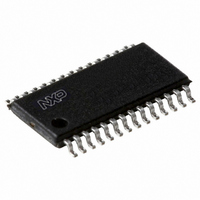P89LPC9341FDH,512 NXP Semiconductors, P89LPC9341FDH,512 Datasheet - Page 34

P89LPC9341FDH,512
Manufacturer Part Number
P89LPC9341FDH,512
Description
IC 80C51 MCU FLASH 8K 28-TSSOP
Manufacturer
NXP Semiconductors
Series
LPC900r
Datasheet
1.P89LPC9351FA112.pdf
(94 pages)
Specifications of P89LPC9341FDH,512
Program Memory Type
FLASH
Program Memory Size
8KB (8K x 8)
Package / Case
28-TSSOP
Core Processor
8051
Core Size
8-Bit
Speed
18MHz
Connectivity
I²C, SPI, UART/USART
Peripherals
Brown-out Detect/Reset, POR, PWM, WDT
Number Of I /o
26
Ram Size
256 x 8
Voltage - Supply (vcc/vdd)
2.4 V ~ 3.6 V
Data Converters
A/D 8x8b; D/A 2x8b
Oscillator Type
Internal
Operating Temperature
-40°C ~ 85°C
Processor Series
P89LPC
Core
80C51
Data Bus Width
8 bit
Data Ram Size
256 B
Interface Type
I2C, SPI, UART
Maximum Clock Frequency
18 MHz
Number Of Programmable I/os
23
Number Of Timers
2
Operating Supply Voltage
2.4 V to 3.6 V
Maximum Operating Temperature
+ 85 C
Mounting Style
SMD/SMT
3rd Party Development Tools
PK51, CA51, A51, ULINK2
Minimum Operating Temperature
- 40 C
On-chip Adc
2 (8 bit, 4 Channel)
Lead Free Status / RoHS Status
Lead free / RoHS Compliant
For Use With
568-1758 - BOARD EVAL FOR LPC93X MCU FAMILY
Eeprom Size
-
Lead Free Status / Rohs Status
Lead free / RoHS Compliant
Other names
935288632512
NXP Semiconductors
P89LPC9331_9341_9351_9361
Product data sheet
7.15.1 External interrupt inputs
Each interrupt source can be individually enabled or disabled by setting or clearing a bit in
the interrupt enable registers IEN0 or IEN1. The IEN0 register also contains a global
disable bit, EA, which disables all interrupts.
Each interrupt source can be individually programmed to one of four priority levels by
setting or clearing bits in the interrupt priority registers IP0, IP0H, IP1 and IP1H. An
interrupt service routine in progress can be interrupted by a higher priority interrupt, but
not by another interrupt of the same or lower priority. The highest priority interrupt service
cannot be interrupted by any other interrupt source. If two requests of different priority
levels are pending at the start of an instruction, the request of higher priority level is
serviced.
If requests of the same priority level are pending at the start of an instruction, an internal
polling sequence determines which request is serviced. This is called the arbitration
ranking. Note that the arbitration ranking is only used to resolve pending requests of the
same priority level.
The P89LPC9331/9341/9351/9361 has two external interrupt inputs as well as the
Keypad Interrupt function. The two interrupt inputs are identical to those present on the
standard 80C51 microcontrollers.
These external interrupts can be programmed to be level-triggered or edge-triggered by
setting or clearing bit IT1 or IT0 in Register TCON.
In edge-triggered mode, if successive samples of the INTn pin show a HIGH in one cycle
and a LOW in the next cycle, the interrupt request flag IEn in TCON is set, causing an
interrupt request.
If an external interrupt is enabled when the P89LPC9331/9341/9351/9361 is put into
Power-down or Idle mode, the interrupt will cause the processor to wake-up and resume
operation. Refer to
All information provided in this document is subject to legal disclaimers.
Section 7.18 “Power reduction modes”
Rev. 5 — 10 January 2011
8-bit microcontroller with accelerated two-clock 80C51 core
P89LPC9331/9341/9351/9361
for details.
© NXP B.V. 2011. All rights reserved.
34 of 94















